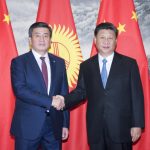by David Isenberg
For the past few decades the vast majority of private security companies (PSC) operating internationally have come from a relatively small number of countries: the United States, Great Britain and other European countries, and Russia. Companies like Blackwater and DynCorp are well known. But that seeming monopoly is opening up to new players, like DeWe Group, China Security and Protection Group, and Huaxin Zhongan Group. What they all have in common is that they are from China.
China’s private security sector has been steadily growing in lockstep with China’s overall economic growth since the early 21st century, albeit in a primarily domestic role. As of 2013 there were 4,000 registered PSCs in China employing more than 4.3 million security personnel, catering primarily to China’s growing number of millionaires.
Up until about ten years ago there weren’t many Chinese PSC operating outside China. However, the passage of a “Regulation on the Administration of Security and Guarding Services” in January 2010 supplied the definition and structure needed for widespread growth.
That “Regulation” categorized PSCs into two types: security companies and security companies engaged in armed escorting services. The latter requires registered capital assets of at least ten million renminbi (RMB), “being a wholly state-owned company or having state-owned capital which accounts for at least 51 percent of the total amount of its registered capital,” and most importantly, “having escorting security guards who meet the requirements as prescribed in the ‘Regulation on the Management of Use of Firearms by Full-time Escorting Security Guards.’”
This regulation is important for at least two reasons. First, it may make it somewhat easier for a Chinese PSC to hire armed contractors, something traditionally opposed by the Chinese government due to its concerns about civilian ownership of firearms. Chinese PSCs are banned from sending staff abroad, and PSCs’ security guards technically become employees of clients, rather than the PSCs, once they are sent abroad.
This is, after all, the country whose core principle is that “The Party controls the gun.” Traditionally, Chinese PSCs did not arm their guards, preferring to rely on people with martial arts skills, or use of nonlethal weapons.
Second, the regulation ties Chinese PSCs to the government far more tightly than their counterparts in the West, making them far more of a government asset.
However, Chinese PSCs have been operating and will increasingly operate overseas. Why? Because of China’s new Silk Road, or more formally, the Belt and Road Initiative, launched by Chinese leader Xi Jinping in late 2013. Belt and Road is a development strategy that focuses on connectivity and cooperation between Eurasian countries. The Initiative is structured along several land corridors and the maritime silk road, encompassing around 60 countries, primarily in Asia and Europe but also including Oceania and East Africa.
Given all the countries involved in the initiative, inevitably some Chinese companies will find themselves operating in high risk environments. From 2015-2017 about 56 per cent of China’s non-financial overseas investments in the 65 Silk Road countries was in high-risk places, such as Syria, Turkey and Pakistan.
As the Financial Times reported in February 2017, “Chinese companies service power stations in Iraq and a telecommunications network in Syria; they mine copper in Afghanistan and pump oil in South Sudan. SIA Energy, a Beijing consultancy, estimates that 7m tons a year of oil produced by Chinese state companies are routinely shut in worldwide due to violence in the likes of Iraq and South Sudan.”
Iraq, in particular, will continue to be a big magnet for Chinese PSCs. The Arab Weekly reported in May that, “Recent aggressive bidding by Chinese state-owned enterprises has won awards from the Iraqi Ministry of Oil for four development projects as well as for two of seven exploration blocks in the less safe north-east, which offers good prospects for oil and gas exploitation but also calls for sophisticated risk prevention and crisis management.”
And where there is conflict and high risk there are also people seeking to make a profit off of it. So, it should come as no surprise that Erik Prince, co-founder of Blackwater, and the Energizer Bunny of the PSC sector, is very much involved in China’s PSC sector.
A December 19, 2016 press release issued by Frontier Services Group, for which Prince is Executive Director and Chairman, stated that FSG is “is adjusting its corporate strategy to better capitalize on the opportunities available from China’s One Belt, One Road (OBOR) development initiative.” FSG announced it would open forward operating bases in China’s Yunnan province and Xinjiang Uyghur Autonomous Region to provide training, communications, risk mitigation, risk assessments, information gathering, medevac and joint operations centers that coordinate security, logistics and aviation services.
As Quartz noted, Yunnan is a natural link between China and its Southeast Asian neighbors. The mountainous province was historically home to kingdoms and trade networks that extended deep into these countries’ present territories. And resource-rich Xinjiang, which is majority Muslim, has been on the receiving end of increasingly repressive Chinese rule in recent years.
The press release’s language is carefully phrased to avoid any implication that FSG is doing anything of a military nature. Given that U.S. law prohibits the export of military services or equipment to China one can understand why. However, in 2016 the Intercept ran a story saying that Prince, sometimes using his role at Frontier, was pitching security and paramilitary services. Since then, as BuzzFeed reported, two FSG officials have resigned when it became clear that Frontier would be providing security services in support of Chinese government objectives.
But the best example to date of how little stock can be placed in the word of FSG or Prince is the Washington Post article published this past May:
Beijing’s International Security Defense College, which boasts of becoming “the largest private security training school in China,” sits behind a 45-foot-high exterior wall and a barricade. Inside the compound, trainers with police and military experience teach classes on tackling detainees, handling hostage situations and thwarting terrorist attacks.
The school is overseen by Frontier Services Group, a Hong Kong-based company founded by Erik Prince, a former Navy SEAL who created Blackwater, a security firm that played a major and controversial role in the U.S. wars in Iraq and Afghanistan.
In November, Frontier graduated its first class of “overseas security specialists,” who were given “strict, strenuous and systematic” training to manage security in “high risk environments, warzones and operations across the globe,” according to a Frontier promotional statement. Prince delivered the commencement address by video link.
The school’s promotional materials boast that Frontier has trained more than 5,000 Chinese military personnel, 200 plainclothes police officers, 500 SWAT specialists, 200 railway police officers and 300 overseas military police officers. A slogan painted on the school’s wall reads, “Training ground for warriors.”





